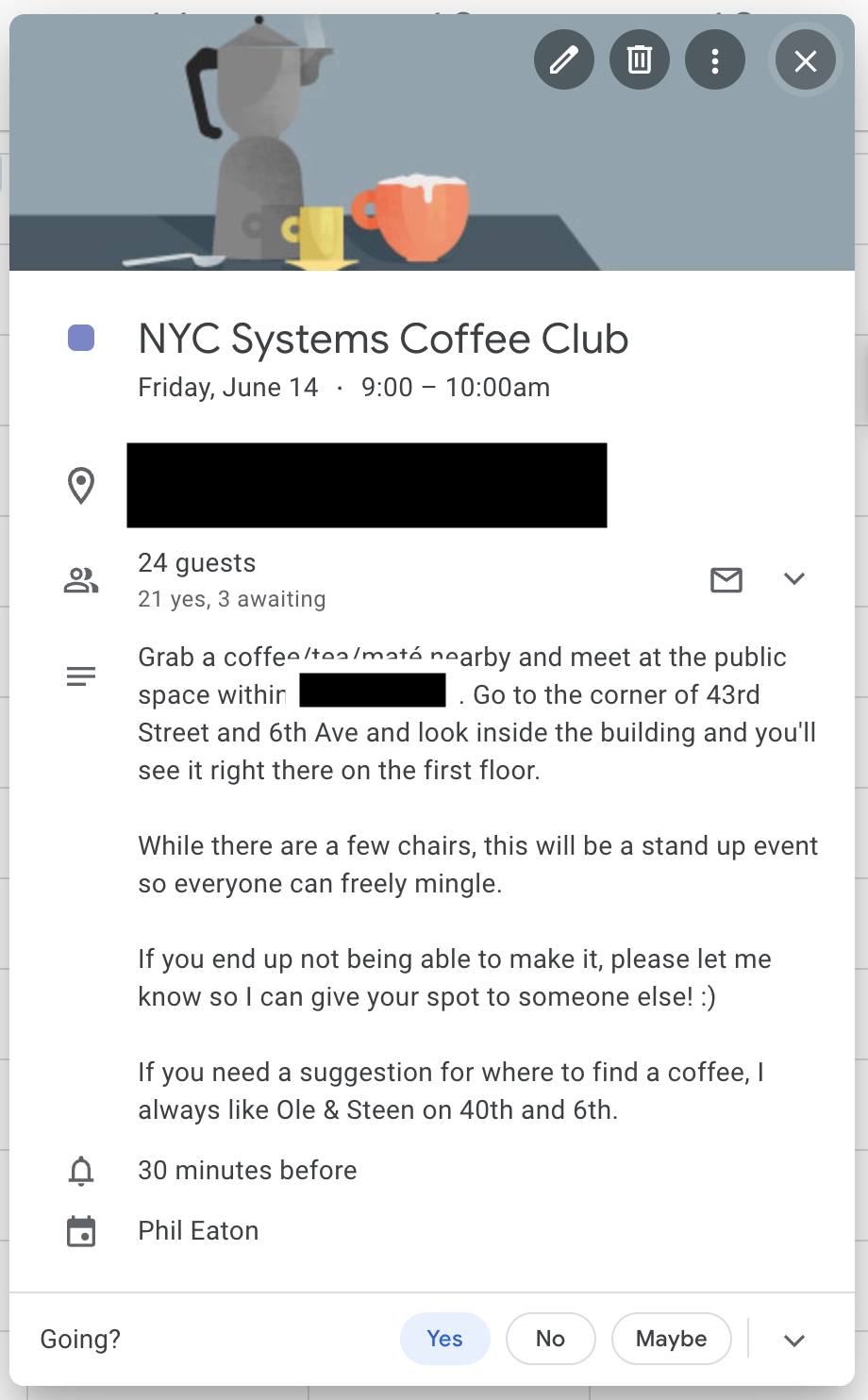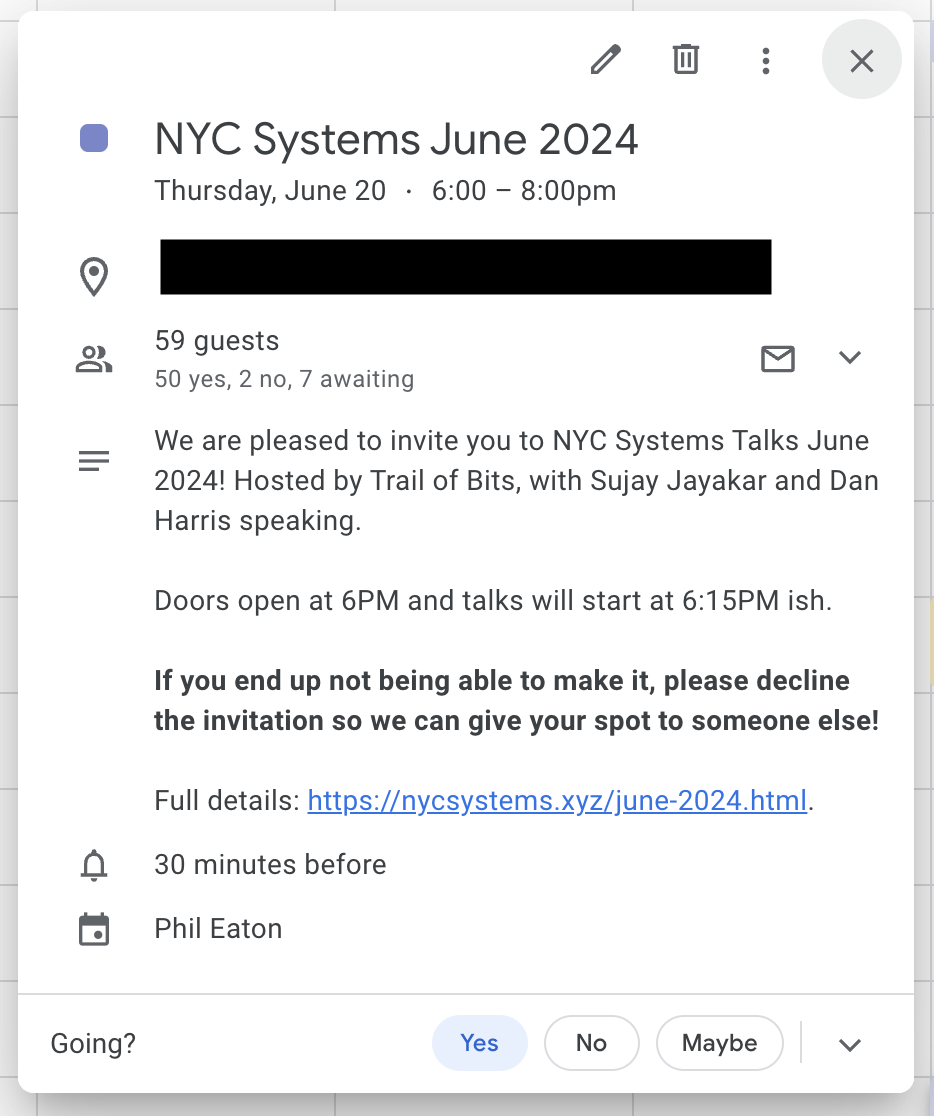This year has seen a resurgence in really high quality systems programming meetups. Munich Database Meetup, Berlin Systems Group, SF Distributed Systems Meetup, NYC Systems, Bengaluru Systems, to name a few.
This post summarizes a bit of disappointing recent tech meetup history, the new trend of excellent systems programming meetups, and ends with some encouragement and guidance for running your own systems programming events.
I will be a little critical in this post but I want to preface by saying: organizing meetups is really tough! It takes a lot of work and I have a huge amount of respect for meetup organizers even when their meetup style did not resonate with me.
Although much of this post talks about NYC Systems, the reason I think this post is worth writing is because so many other meetups in a similar vein popped up. I hope to encourage these other meetups and to encourage folks in other major metros (London, for example) to start similar meetups.
Meetups
I used to attend a bunch of meetups before the pandemic. But I quickly got disillusioned. Almost every meetup was varying degrees of startups pitching their product. The last straw for me was sitting through a talk at a JavaScript meetup that was by a devrel employee of a startup who literally gave a tutorial for their product.
There were also some pretty intelligent meetups like the New York Haskell Users Group and the New York Emacs Meetup. But not being an expert in either domain, and the attendees almost solely appearing to be experts, I didn't particularly enjoy going.
There were a couple of meetups that felt inclusive for various skill-levels of attendees yet still went into interesting depth. Specifically, New York Linux User Group and Papers We Love NYC.
These meetups were exceptional because they were language- and framework-agnostic, they would start broad to give you background, but then go deep into a topic. Maybe you only understood 50% of what was covered. But you get exposed to something new from an expert in that domain.
Unfortunately, the pandemic happened and these two excellent meetups basically have not come back.
A couple of students in Munich
The pandemic ended and I tried a couple of meetups I thought might be better quality. Rust and Go. But they weren't much better than I remembered. People would give a high level talk and brush over all the interesting concepts.
I had been thinking of doing an in-person talk series since 2022.
If I put together a systems/databases/distributed systems meetup in NYC (a physical meetup, not Zoom), who'd be interested (in attending, or presenting, or helping me organize, or donating space)?
— Phil Eaton (@eatonphil) September 27, 2022
No promises!
But I was busy with TigerBeetle until December of 2023 when I was messaged on LinkedIn by Georg Kreuzmayr, a graduate student at Technical University of Munich (TUM).
Georg and his friends, fellow graduate students at TUM, started a database club: TUMuchData. We got to talking about opportunities for collaboration and I started feeling a bit embarrassed that a graduate student had more guts than I had to get back onto the meetup organizer wagon.
A week later, with assurance from Justin Jaffray that at least he would show up with me if no one else did, I started the NYC Systems Coffee Club to bring together folks in NYC interested in any topic of systems programming (e.g. compilers, databases, web browser internals, distributed systems, formal methods, etc.). To bring them together in a completely informal setting for coffee at 9am in the morning in a public space in midtown Manhattan.
Trying something new! If you're a dev in NYC working
— Phil Eaton (@eatonphil) December 11, 2023
on (or interested in) systems programming, grab a coffee and come hang out at 1 Bryant Park (indoor space) this Thursday 9AM - 9:30AM.
See post for details and fill out the Google Form or DM me!https://t.co/A4bzcPGy6x pic.twitter.com/n1ECMd59ev
I set up that linked web page and started collecting subscribers to the club via Google Form. Once a month I'd send an email out to the list asking for RSVPs to this month's coffee club. The first 20 to respond would get a calendar invite.

And about the same time I started asking around on Twitter/LinkedIn if someone would be interested in co-organizing a new systems programming meetup in NYC. Angelo Saraceno immediately took me up on the idea and we met up.
NYC Systems
We agreed on the premise: this would be a language- and framework-agnostic meetup that was focused on engineering challenges, not product pitches. It would be 100% for the sake of corporate marketing, but corporate marketing of the engineering team, not the product.
NYC Systems was born!
We'd find speakers who could start broad and dive deep into some interesting aspect of databases, programming languages, distributed systems, and so on. Product pitches were necessary to establish a context, but the focus of the talk would be about some interesting recent technical challenge and how they dealt with it.
We'd schedule talks only every other month to ease our own burden in organizing and finding great speakers.
Once Angelo and I had decided to go forward, the next two challenges were finding speakers and finding a venue. Thanks to Twitter and LinkedIn, finding speakers turned out to be the easy part.
It was harder to find a venue. It was surprisingly challenging to find a company in NYC with a shared vision that the important thing about being associated with a meetup like this is to be associated with the quality of speakers and audience we can bring in by not allowing transparent product pitches.
Almost every company in Manhattan with space we spoke with had a requirement that they have their own speaker each night. That seemed like a bad idea.
I think it was especially challenging to find a company willing to relax about branding requirements like this because we were a new meetup.
It was pretty frustrating not to find a sympathetic company with space in Manhattan. And the only reason we didn't give up was because Angelo was so adament that this kind of meetup actually happen. It's always best to start something new with someone else for this exact reason. You can keep each other going.
In the end we went with the company that did not insist on their own speaker or their own branding. A Brooklyn-based company whose CEO immediately got in touch with me that they wanted to host us, Trail of Bits.
How it works
To keep things easy, I set up a web page on my personal site with information about the meetup. (Eventually we moved this to nycsystems.xyz.) I set up a Google Form to collect emails for a mailing list. And we started posting about the group on Twitter and LinkedIn.
Very pleased to share the first NYC Systems Talks are taking place next Thursday Feb 22nd 6PM. Hosted by @trailofbits, with @paulgb and @StefanKarpinski speaking.
— Phil Eaton (@eatonphil) February 15, 2024
Space is not infinite, fill out the Google Form if you can attend and would like an invite!https://t.co/jNssr5v1kJ
We published the event calendar in advance (an HTML table on the website) and announced each event's speakers a week in advance of the event. I'd send another Google Form to the mailing list taking RSVPs for the night. The first 60 people to respond got a Google Calendar invite.

It's a bit of work, sure, but I'd do anything to avoid Meetup.com.
It is interesting to see every new systems programming meetup also not pick Meetup.com. The only one that went with it, Munich Database Meetup, is a revival of an existing group, the Munich NoSQL Meetup and presumably they didn't want to give up their subscribers. Though most others use lu.ma.
The mailing list is now about 400+ people. And in each event RSVP we have a wait list of 20-30 people. Of course although 60 people say Yes initially, by the time of the event we have typically gotten about 50 people in attendance.
At each event, Trail of Bits provided screens, chairs, food, and drink. Angelo had recording equipment so he took over audio/video capturing (and later editing and publishing).
After each event we'd publish talk videos to our @NYCSystems Youtube.
Network effects
In March 2024, the TUMuchData folks joined Alex Petrov's Munich NoSQL Meetup to form the Munich Database Meetup. In May, Kaivalya Apte and Manish Gill started the Berlin Systems Group, inspired by Alex and the Munich Database Meetup.
I want to start a Berlin Database/Storage systems group, where we have regular meetups, discussions and talks.
— Kaivalya Apte - The Geek Narrator (@thegeeknarrator) May 15, 2024
WDYT? @mgill25 @mehd_io @ClickHouseDB @SnowflakeDB @awscloud @GoogleDE @TUBerlin
Can I get some support? Who else would be interested? #Databases
Thanks…
In May 2024, two PhD students in the San Francisco Bay Area, Shadaj Laddad and Conor Power, started the SF Distributed Systems meetup.
We’re super excited to be organizing a new SF Distributed Systems meetup NEXT WEEK! Our first meetup features @julianhyde and @conor_power23 presenting work on extending SQL and applying algebraic properties, sign up at https://t.co/d2lLDaQ5iJ
— Shadaj Laddad (@ShadajL) May 15, 2024
And in July 2024, Shraddha Agrawal, Anirudh Rowjee and friends kicked off the first Bengaluru Systems Meetup.
Are you ready, Systems Enthusiasts of Bengaluru?
— Bengaluru Systems Meetup (@BengaluruSys) July 4, 2024
Speaking at our first-ever meetup on 6th July, we have:@simsimsandy with "Learn about the systems that power GenAI applications" and @vivekgalatage with "The Browser Backstage: Performance vs Security"
(talks linked below!)
Suggestions
First off, don't pay for anything yourself. Find a company who will host. At the same time, don't feel the need to give in too much to the demands of the company. I'd be happy to help you think through how to talk about the event with companies. It is mutually beneficial for them to get to give a 5-minute hiring/product pitch and not need to do extensive branding nor to give a 30-minute product tutorial.
Second, keep a bit of pressure on speakers to not do an overview talk and not to do a product pitch. Suggest that they tell the story of some interesting recent bug or interesting recent feature. What happened? Why was it hard? What did you learn?
Focusing on these types of talks will help you get a really interesting audience.
I have been continuously surprised and impressed at the folks who show up for NYC Systems. It's a mix of technical founders in the systems space, pretty experienced developers in the systems space, graduate students, and developers of all sorts.
I am certain we can only get these kinds of folks to show up because we avoid product pitch-type talks.
Third, finding speakers is still hard! The best approach so far has been to individually message folks in industry and academia who hang out on Twitter. Sending out a public call is easy but doesn't often pan out. So keep an eye on interesting companies in the area.
Another avenue I've been thinking about is messaging VC connections to ask them if they know any engineers/technical founders/CTOs in the area who could give an interesting technical talk.
Fourth, speak with other organizers! I finally met Alex Petrov in person last month and we had a great time talking about the challenges and joys of organizing really high quality meetups.
I'm always happy to chat, DMs are open.
New post telling a bit of the history behind https://t.co/NEh1tm8v3Q; why it only exists due to folks like @georg_kreuzmayr and @ngeloxyz; the explosion of systems meetups around the world; and encouragement and suggestions for future organizers!https://t.co/dwe4TtmXKK pic.twitter.com/ZMLkVYdZDJ
— Phil Eaton (@eatonphil) July 7, 2024